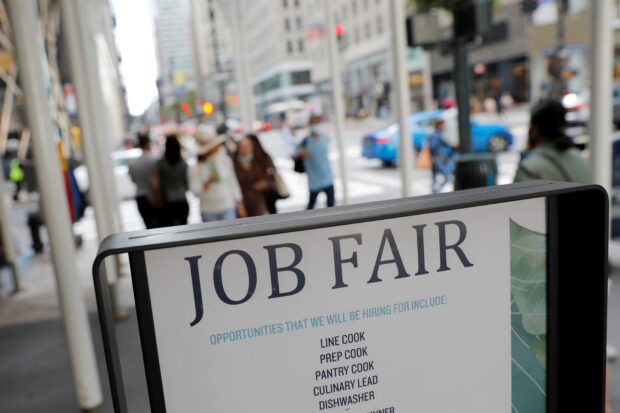
FILE PHOTO: Signage for a job fair is seen on 5th Avenue after the release of the jobs report in Manhattan, New York City, U.S., September 3, 2021. REUTERS/Andrew Kelly/File Photo
WASHINGTON – The number of Americans filing new claims for unemployment benefits fell to a nine-month low last week, indicating that strong job growth persisted in October as the labor market remains tight.
The unexpected decline in initial jobless claims reported by the Labor Department on Thursday added to solid retail sales and factory production in September in suggesting sustained momentum in the economy.
The stream of upbeat economic data bolstered expectations that the Federal Reserve could keep interest rates higher for longer. Financial markets continued to discount a rate hike next month because of soaring U.S. Treasury yields.
“Companies on earnings calls may warn about the outlook and risks ahead, but they are still holding on tight to their workers as good help is increasingly hard to find,” said Christopher Rupkey, chief economist at FWDBONDS in New York.
“The economy and labor markets are simply not slowing down, and time will tell if this will reignite the inflation fires that until recently were looking contained.”
Unemployment drops
Initial claims for state unemployment benefits dropped 13,000 to a seasonally adjusted 198,000 for the week ended Oct. 14, the lowest level since January. Economists polled by Reuters had forecast 212,000 claims for the latest week.
Though the labor market is gradually cooling, conditions remain tight, with claims at the very low end of their range of 194,000 to 265,000 for this year. Unadjusted claims declined 18,561 to 181,181 last week. There were large decreases in Texas, New York, New Jersey, Georgia and California, which more than offset a notable rise in Tennessee.
READ: US job openings post largest rise in 2 years; quits rate unchanged
So far there has been a limited impact from the United Auto Workers (UAW) strikes, which have disrupted supply chains, though claims spiked in Michigan during the week ending Oct. 7, related to the industrial action. Ford Motor, General Motors and Chrysler-parent Stellantis have furloughed and laid off thousands of non-striking workers.
The Fed’s Beige Book report on Wednesday said “labor market tightness continued to ease across the nation” in early October and implied cooling wage pressure. According to the Beige Book “several districts reported improvements in hiring and retention as candidate pools have expanded,” but also noted that “most districts still reported ongoing challenges in recruiting and hiring skilled tradespeople.”
The labor market is showing strength despite the U.S. central bank raising its benchmark overnight interest rate by 525 basis points to the current 5.25 percent to 5.5 percent range since March 2022. Financial markets expect the Fed will leave rates unchanged at its Oct. 31-Nov. 1 policy meeting, according to CME Group’s FedWatch Tool, given the surge in Treasury yields.
Fed Chair Jerome Powell, however, appeared to push back against expectations rate hikes may have reached an end, telling the Economic Club of New York that the strength in the economy and labor market “could put further progress on inflation at risk and could warrant further tightening of monetary policy.”
READ: Powell: Strong economy may need more restraint, but bond markets help
But Powell also acknowledged the recent rise in geopolitical tensions and tighter financial conditions.
Longer-dated bond yields have risen to multi-year highs in response to the economy‘s resilience. The labor market is driving consumer spending and the overall economy, ultimately keeping inflation elevated. The economy is expected to have grown in the third quarter at its fastest pace since late 2021.
Stocks on Wall Street were trading higher. The dollar fell against a basket of currencies. U.S. Treasury prices slipped, with the yield on the benchmark 10-year note flirting with 5 percent, a level not seen since just before the financial crisis in 2007.
Home sales depressed
While the broader economy is weathering the high interest rate environment, the housing market is in the doldrums and business sentiment remains weak. A second report from the National Association of Realtors showed existing home sales dropped 2 percent last month to a seasonally adjusted annual rate of 3.96 million units, the lowest level since October 2010.
Surging mortgage rates and tight supply combined to reduce affordability for many first-time buyers, whose share of purchases was 27 percent in September, well below the 40 percent that economists and realtors say is needed for a robust housing market.
With the average rate on the popular 30-year fixed mortgage vaulting to a nearly 23-year high of 7.63 percent last week, according to data from mortgage finance agency Freddie Mac, home resales are likely to decline further.
READ: Curtains drawing on runaway rise in global house prices- Reuters poll
“There’s no relief in sight for the battered U.S. housing market absent a sharp drop in mortgage rates and a surge in inventory, which would go a long way toward improving affordability,” said Jay Hawkins, a senior economist at BMO Capital Markets in Toronto.
A third report from the Philadelphia Fed showed business conditions in the Mid-Atlantic region still subdued in October, though manufacturers expected an improvement over the next six months. Firms in the region that covers eastern Pennsylvania, southern New Jersey and Delaware reported mostly steady employment this month.
The claims report covered the week during which the government surveyed business establishments for the nonfarm payrolls component of October’s employment report. Claims fell between the September and October survey periods. The economy created 336,000 jobs in September, the most in eight months.
Data next week on the number of people receiving benefits after an initial week of aid, a proxy for hiring, will shed more light on the health of the labor market in October. The so-called continuing claims increased 29,000 to a still-low 1.734 million during the week ending Oct. 7, the claims report showed.

